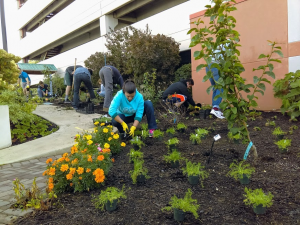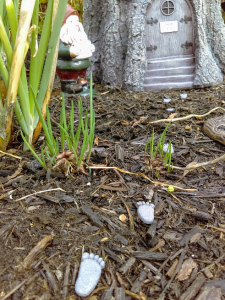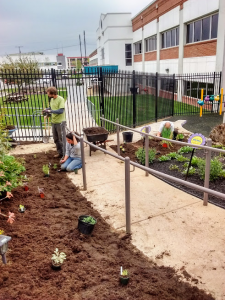
For many families of seriously ill children undergoing medical care, The Philadelphia Ronald McDonald House is a second home away from home. Creating a community of comfort and hope is central to the organization, which provides housing and supportive services for families through two houses, two Family rooms at The Children’s Hospital of Philadelphia, a Hospitality Kiosk at St. Christopher’s Hospital for Children, and a Ronald McDonald camp.
Last spring in 2016, Ronald McDonald House property manager Carolann Costa along with Director of Special Projects Kelly Case decided to pursue partnership with The Philadelphia Orchard Project to expand the House’s culture of support to the grounds through the planting of a food-forest styled orchard with fruit trees, currants, raspberries, strawberries, a perennial sensory herb garden, and a fairy garden, complete with stools and stepping stones, for even the tiniest of tots to take rest.

Costa oversees operations of the property’s 20 room house, the hospital’s family rooms, and the newly planted orchard. She makes sure families have what they need for overnight stays. She makes sure the plants are watered, the fruits are harvested, and the grounds are tidy. Care-taking seems to come naturally for Costa. A self-described ‘city girl’ who grew up in an Italian family, some of her early memories are of her father growing tomatoes and basil in their family’s backyard. She carries his influence forward with her interest in fruit-growing and a container-grown fig tree at home.
Although most see the orchard’s fruits as the primary draw, Costa sees the orchard foremost as a place where families can go to take their mind off their immediate circumstances. “A lot of our families come from other states, from other countries. I thought the orchard could be a nice place where families could go to have something to do, to tend to,” Costa says. “Maybe they grow strawberries at home or grew up farming or gardening, this could be that place where families go to feel a little piece of home wherever they are.”
Children have really taken to the garden, Costa shared. “We were able to get a lot of strawberries, and while we’d wait for transport to the hospital, the children would look to see who could find the biggest ones.” The sensory herb garden has also been a big draw for children to experience herbs like the fluffy-to-the-touch lamb’s ear, or oregano, which to one child, brought immediate scent-recognition for its season topping on pizza.

For some children with physical disabilities like scoliosis or arthrogryposis that causes the limbs to fuse, the orchard has also been a space for children to develop and practice becoming independent in their bodies. Many of the children who receive treatment at Shriner’s Hospital have been able to use the orchard space as a place where they can practice picking fruit with their hands, mouth, or feet.
As the orchard grows along with its cast of 4 dedicated orchard volunteers and many others who come to the site, Costa envisions the possibility of bringing more children and families out into the orchard to care for the plants, harvest the fruit, and eventually provide fruit from the orchard to the Family Rooms. “We imagine the orchard as a part of the landscape, full and lush, and hope that it will be successful.”
This POP Partner Feature written by Education Director Alyssa Schimmel.
SUPPORT US! If you found this entry useful, informative, or inspiring, please consider a donation of any size to help POP in planting and supporting community orchards in Philadelphia: phillyorchards.org/donate.